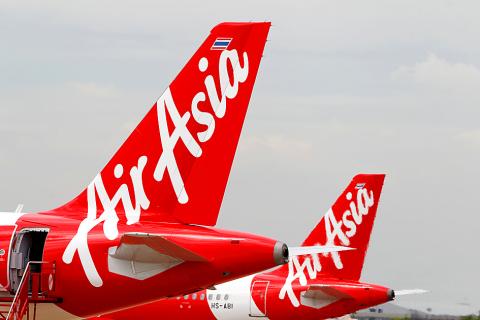Philippines AirAsia Inc, a low-cost carrier based in Manila, is scheduled to start regular flights to Taiwan next month.
Philippines AirAsia, an affiliate of AirAsia Bhd, a low-cost airline based in Malaysia, is planning to launch its services between Manila and Taipei on Nov. 1 with seven flights per week.
The Philippine carrier, which is a joint venture between three Philippine investors and AirAsia International Ltd, is also planning to provide three flights between Taipei and Cebu per week, starting on Nov. 4.

Photo: Reuters
Meanwhile, Hong Kong Express Airways Ltd, a low-fare airline based in Hong Kong, is planning to launch regular flight services between the territory and Hualien on Dec. 6, with three flights a week.
Hong Kong Express currently provides regular flights between Hong Kong and Taichung.
Nineteen budget carriers operate in the Taiwanese market after V Air (威航), a subsidiary of Taiwanese mid-sized international carrier TransAsia Airways (復興航空), ended its services on Oct. 1 as a result of massive losses.
In Taiwan, only one Taiwan-based budget airline — Tigerair Taiwan (台灣虎航), a joint venture between Tiger Airways Singapore Pty Ltd and Taiwan’s China Airlines (CAL, 中華航空) — remains operational, but it is struggling financially, while the other 18 competitors are based overseas.
CAL chairman Ho Nuan-hsuan (何煖軒) confirmed that the parent company has set up a task force to study the future of Tigerair Taiwan. The joint venture agreement between Tigerair Taiwan and Tiger Airways is scheduled to expire in April next year.
With the arrival of Philippines AirAsia, the number of low-cost carriers operating in Taiwan will rise to 20, indicating that the closure of V Air has not deterred foreign budget carriers from entering the market.
V Air launched its services in December 2014, three months after Tigerair Taiwan was launched. Both eyed the booming budget carrier market, but V Air posted accumulated losses of about NT$900 million (US$28.59 million) and Tigerair Taiwan incurred losses of about NT$1.1 billion in less than two years, with the losses more than half the two carriers’ paid-in capital.
The budget airline business in Taiwan has continued to grow since budget carriers first began operating locally in 2004.
Budget airlines last year transported 4.7 million passengers, almost 13.5 percent of the total number of passengers handled by carriers operating in Taiwan, up from about 3 percent in 2012.
However, the losses incurred by V Air and Tigerair Taiwan indicate that Taiwanese budget carriers are unable to compete with their foreign counterparts.
Yeh Wei-chien (葉文建), an associate professor at Kainan University’s Department of Air Transport, said that the operating costs of locally based budget carriers have been higher than those of their foreign counterparts due to their relatively smaller size.
Market sources have expressed concern about the future of Tigerair Taiwan, because if the only remaining Taiwanese budget carrier closes, the local low-cost airline market will be dominated by foreign players.

CHIP RACE: Three years of overbroad export controls drove foreign competitors to pursue their own AI chips, and ‘cost US taxpayers billions of dollars,’ Nvidia said China has figured out the US strategy for allowing it to buy Nvidia Corp’s H200s and is rejecting the artificial intelligence (AI) chip in favor of domestically developed semiconductors, White House AI adviser David Sacks said, citing news reports. US President Donald Trump on Monday said that he would allow shipments of Nvidia’s H200 chips to China, part of an administration effort backed by Sacks to challenge Chinese tech champions such as Huawei Technologies Co (華為) by bringing US competition to their home market. On Friday, Sacks signaled that he was uncertain about whether that approach would work. “They’re rejecting our chips,” Sacks

Taiwan’s exports soared 56 percent year-on-year to an all-time high of US$64.05 billion last month, propelled by surging global demand for artificial intelligence (AI), high-performance computing and cloud service infrastructure, the Ministry of Finance said yesterday. Department of Statistics Director-General Beatrice Tsai (蔡美娜) called the figure an unexpected upside surprise, citing a wave of technology orders from overseas customers alongside the usual year-end shopping season for technology products. Growth is likely to remain strong this month, she said, projecting a 40 percent to 45 percent expansion on an annual basis. The outperformance could prompt the Directorate-General of Budget, Accounting and

NATIONAL SECURITY: Intel’s testing of ACM tools despite US government control ‘highlights egregious gaps in US technology protection policies,’ a former official said Chipmaker Intel Corp has tested chipmaking tools this year from a toolmaker with deep roots in China and two overseas units that were targeted by US sanctions, according to two sources with direct knowledge of the matter. Intel, which fended off calls for its CEO’s resignation from US President Donald Trump in August over his alleged ties to China, got the tools from ACM Research Inc, a Fremont, California-based producer of chipmaking equipment. Two of ACM’s units, based in Shanghai and South Korea, were among a number of firms barred last year from receiving US technology over claims they have

BARRIERS: Gudeng’s chairman said it was unlikely that the US could replicate Taiwan’s science parks in Arizona, given its strict immigration policies and cultural differences Gudeng Precision Industrial Co (家登), which supplies wafer pods to the world’s major semiconductor firms, yesterday said it is in no rush to set up production in the US due to high costs. The company supplies its customers through a warehouse in Arizona jointly operated by TSS Holdings Ltd (德鑫控股), a joint holding of Gudeng and 17 Taiwanese firms in the semiconductor supply chain, including specialty plastic compounds producer Nytex Composites Co (耐特) and automated material handling system supplier Symtek Automation Asia Co (迅得). While the company has long been exploring the feasibility of setting up production in the US to address